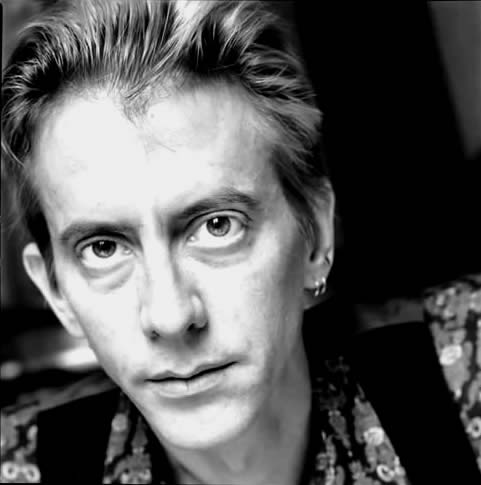

photo (1997): Isabelle Levy
Theo Hakola was born and raised in Spokane, Washington. His blood is Finnish and Swedish. His local heroes: Chief Joseph, Maury Wills and Jimi Hendrix. His position: shortstop. In 1973, Hakola left Spokane in a pursuit of life, liberty and happiness that took him from Guatemala to Spain, and New York City to London before finally depositing him in Paris in 1978. He didn't exactly find happiness, but he was once employed full time by the U.S. Committee for a Democratic Spain (1975); by the New York City club Tramps where he did sound, lights and booking (1977-78); by Radio France, Radio Monte-Carlo, Radio Cité 96 and Radio Nova in Paris as DJ/programmer/producer; by various restaurants as waiter; by assorted language schools as teacher, and by Antioch College in Ohio (where he also studied) to give a course on the Spanish Civil War.
There was a year at the London School of Economics and Political Science in there, along with various articles and photos on European politics and culture in American and French publications. Not to mention numerous translations and a time as assembly line worker making doll's eyes in Barcelona...
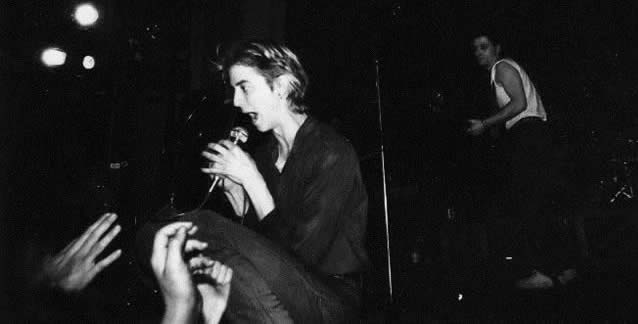
1981
...There was also Orchestre Rouge. Founded by Hakola in Paris in 1980, the band played extensively in Europe and made two albums with RCA-France – the first produced by Martin Hannett at Strawberry Studios in Manchester – before breaking up in 1983.
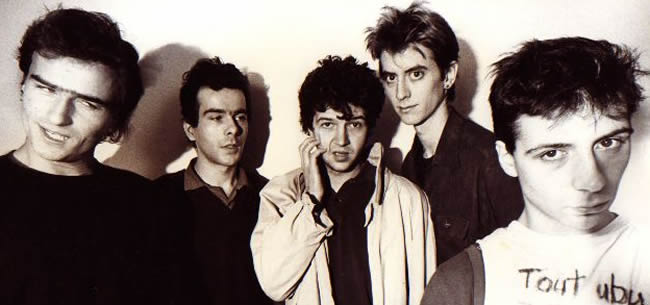
ORCHESTRE ROUGE, 1981
1982, Trébuerden (France) photo: Fabrice Picard |
1982, Madrid photo: Daniel Lainé |
In the fall of that year, Hakola was given the role of Alaskawolf Joe in Hans Peter Cloos' production of Brecht/Weill's "Mahagonny" in Paris, Lille and St. Etienne.
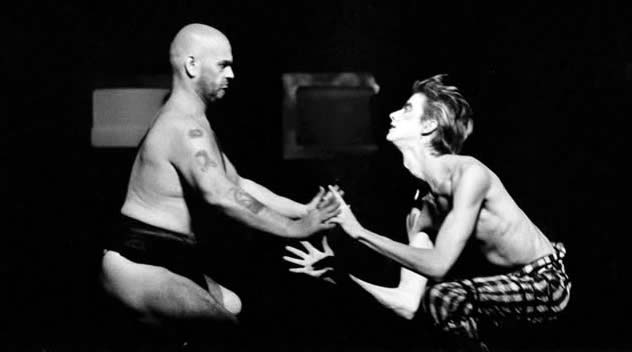
Théâtre des Bouffes du Nord, 1983 photo: A. Le Blanc
And then there was Passion Fodder: "Anarcho-country... Beret-sporting cowboy Bolsheviks bashing the life out of an electric guitar... sheer sumptuous bedlam... Surrounded by four equally volatile fellow-musicians, all Parisians, Theo has turned the edgy, quivering, deliciously articulate Passion Fodder into a crisp and colorful vehicle for his own billowing indignation." (Sounds 13-8-88) Formed in 1985, when Hakola signed to Barclay-Polygram in France and when music began to have more to do with video clips than songs, Passion Fodder recorded five albums of the little gems in almost as few years. International distribution by Beggars Banquet helped get the music out to the rest of the world and enabled the band to tour America in 1988 after Island-U.S.'s release of their second L.P. "Fat Tuesday"... |
1985 |
PASSION FODDER, 1990 – Hakola, Bénédicte Villain, Pascal Humbert, Jean-Yves Tola, Lionel Dollet |
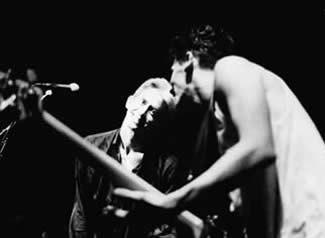 |
"Hakola's vision is painfully raw, twisted and compulsive. Throughout the album he's railing against life's ugliness and monotony in the manner of the 19th Century poet tripped out on opium. The songs burn with the urgency of the afflicted and it's impossible to put aside an image of him singing up from the gutter; Baudelaire with an electric guitar." (New Musical Express 8-1-87)
Paris Bataclan, 1990 photos: Fabrice |
|
photo: Renaud Monfourny |
In 1987, Hakola produced the first album by Noir Désir –"Où veux-tu que je r'garde ?" – after having convinced Barclay (Polygram-France) to sign this combo from Bordeaux whose impact on the French music scene would soon assume Nirvanaesque propoortions. He would later produce albums by Les Hurleurs, EV, Les Malpolis and, most recently, Gecko Palace. In 1988, he wrote and performed, with Passion Fodder, the sound-track for “Peaux de vaches,” a film by Patricia Mazuy starring Sandrine Bonnaire. |
photo: Philippe Prevost |
In 1989, Passion Fodder moved to Los Angeles where they recorded their fourth and fifth albums - "Woke Up This Morning..." and "What Fresh Hell Is This?" before finally calling it a day in 1991. While Jean-Yves Tola and Pascal Humbert went on to become the drummer and bass player of 16 Horsepower, Hakola continued to work with violinist Bénédicte Villain and has now recorded six solo albums. The first – "Hunger of a Thin Man" (1994) – which featured Michelle Shocked and Claire Touzi Dit Terzi along with Noir Désir's Bertrand Cantat and Serge Teyssot-Gay was followed in 1995 by "The Confession" in 1995.
In 1989, Passion Fodder moved to Los Angeles where they recorded their fourth and fifth albums - Woke Up This Morning and What Fresh Hell Is This? before finally calling it a day in 1991. While Jean-Yves Tola and Pascal Humbert went on to become the drummer and bass player of 16 Horsepower, Hakola continued to work with violinist Bénédicte Villain.
His first solo album – Hunger of a Thin Man (1994) – featured Michelle Shocked and Claire Touzi Dit Terzi along with Noir Désir’s Bertrand Cantat and Serge Teyssot-Gay. Following the release in 1995 of his second album, The Confession, Hakola moved back to France where he performed a remarkable series of concerts taking him and his associates from small bars to major festivals like Les Eurockéennes in Belfort. Amongst those seduced: Nick Cave and The Bad Seeds who invited Hakola to open for them on their European tour and Hakola’s third album – Overflow (1997) – featured The Bad Seeds’ incomparable Thomas Wydler on drums. |
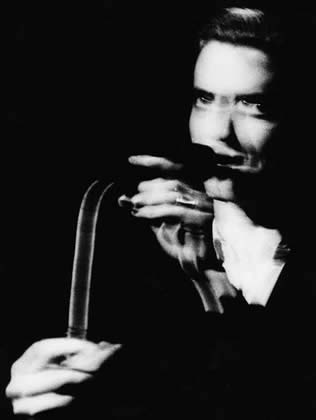 |
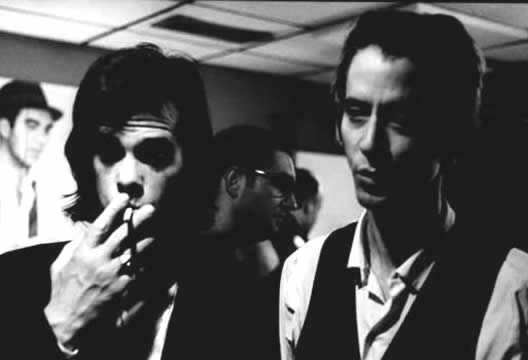
1997 photo: Richard Dumas
In 1999-2000 Hakola directed and performed, along with eight other actors and musicians, his play "La Chanson du Zorro andalou" in theaters in Rennes, Lille and Bagnolet (Paris). At the same time, the music of the play – featuring the voices of Hakola, Jeanne Balibar and Marie Payen as well as the saxophone of Akosh and the drums of Thomas Wydler – was recorded and released in France as a CD package including the text.
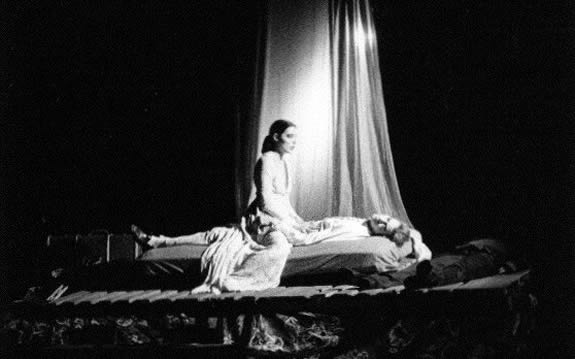
Théâtre de l’Echangeur, 2000 photo: E. Feron-Baril
In 2000, Hakola completed his first novel – The Way of Blood – published in France by Le Serpent a plumes (2001) as La Route du sang to great critical acclaim and soon followed by his second novel – Blood Streams – published by the same publisher in 2003 as La Valse des affluents and equally well received: “The author, mining for gold, has pulled it off, happily knitting together romantic, political, artistic and family plot lines while the diabolical rhythm of his carefully worked sentences thrill in a roman-fleuve featuring several scintillating loose canons.” – Élisabeth Vust (24 Heures 4-4-2003). Hakola's completed his “Blood Trilogy” with The Blood of Souls, published in France by Éditions Intervalles as Le Sang des âmes in 2008. His fourth novel – Rakia – came out in French translation with Intervalles in 2011 and his fifth – The Snake Pit – was published in French translation as Idaho Babylone by Actes Sud in 2016.
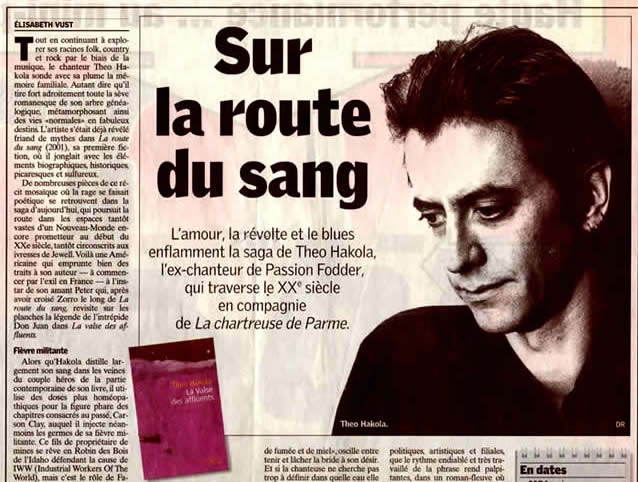
With “Une Dizaine de morts” – a musical reading for five voices based on the works of the Canadian author Michael Ondaatje and performed in Lyon, Manosque, Paris and Lille (2003-2004), Hakola put into practice a form mixing literature and song that he would continue to develop with “Les Chansons de La Valse des affluents” (2004-2005), “Le Chant des âmes” (2009), “La Ballade de Carson Clay” (2011) and "Rakia", all four adapted from his own books. He also collaborated with Paola Comis on “Ellen Foster” – a theatrical adaptation of the Kaye Gibbons novel (translation, music and co-direction by Hakola) staged in Dijon, Lille, Bagnolet and Lyon (2003-2005). In 2007, Hakola composed and performed the music for Racine’s “La Thébaïde,” directed by Sandrine Lanno in Montreuil and Colmar, and he continues to work as composer, musician and actor in French theater and film. |
|
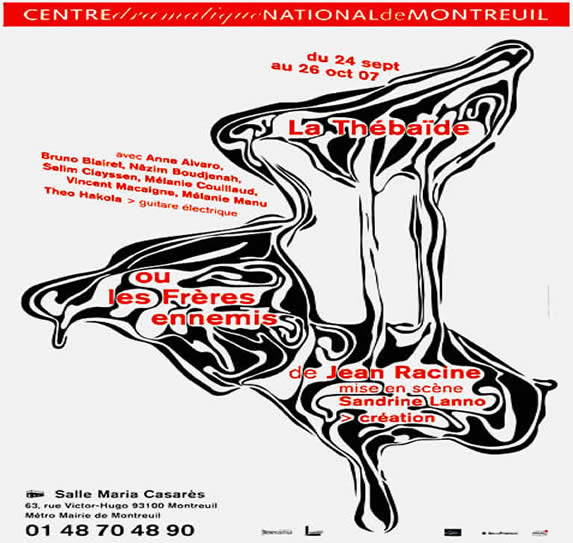
Recording albums, for Hakola, would seem to have taken a back seat to literature and theater as the new century progressed... until 2007 when he came out with Drunk Women and Sexual Water on his own Wobbly Ashes Records label where fourteen songs came together for 79 minutes of music and no filler graced by the presences of Bénédicte Villain, Brice Pirotais, Cyril Bilbeaud, Lionel Dollet, Alexandre Margraff and Warren Ellis.
In 2012, Theo Hakola was back with his sixth solo album – This Land Is Not Your Land – returning to what he claims is his greatest pleasure: making albums. Lucky listener! This time around, a title wink to Woody Guthrie is coupled with more than the usual concern for his mother country in this electoral year – cf. the album’s “Wobbly Medley” or its title song premised on the belief that, while the President may well have reached out to and sought consensus with those who ultimately want nothing more than to bring him down, it doesn't mean the rest of us have to. Indeed, This Land Is Not Your Land is more songs about love and hate (of a man, of a woman, of your country or his), more songs about baseball and a life-long need... to laugh. It is feedback stampeding waltzing three-beats and soaring violins lashed to Hakola’s signature slide guitar. It is, once again, music meant to ring out as eloquently decades from now as it does today, and it’s words that Melody Maker once called “a lyric of such intensity that it’s almost real life.” It’s a knife to the listener’s brain as well as the listener’s heart, a blade forged by a full and varied existence and, this time around, happily honed with his scintillating concert band The Wobbly Ashes: Bénédicte Villain (violin), Matthieu Texier (guitar) Laureline Prod'homme (bass) and Tatiana Mladenovitch (drums).
This Land Is Not Your Land was followed in 2016 by I Fry Mine in Butter!, an album of fifteen covers and then, in January of 2020, by the fifteenth album of a 40 year span of music-making – Water Is Wet.
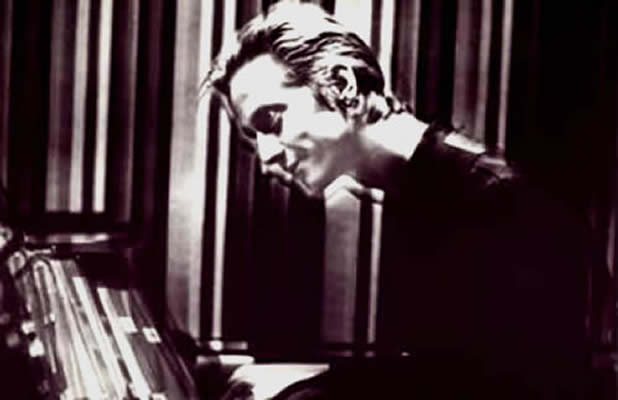
with Passion Fodder (Barclay/Polygram-France):
with Orchestre Rouge (RCA-France) :
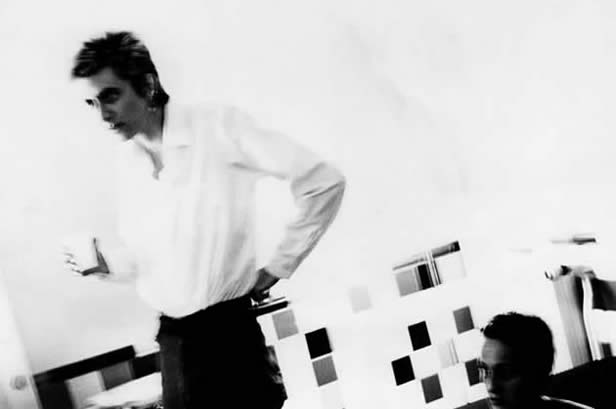
photo: Claire Flack